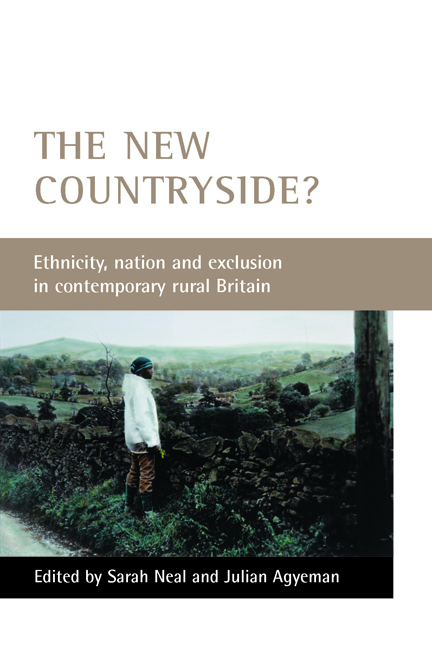Afterword
Published online by Cambridge University Press: 18 January 2022
Summary
Beyond the familiar absence, unfamiliar presence paradigm
Kye Askins’ chapter mentions an article in the Guardian newspaper. As Askins critically notes, the article, ‘Countryside retreat’ by Raekha Prasad (28 January 2004), examined ethnicity and the countryside through the premise of the familiar absence of black and minority ethnic visitors. Prasad's article includes short ‘interviews’ with six high-profile British black and minority ethnic figures about their autobiographic thoughts on the countryside. While Cloke (2004, pp 17-18) has detailed their accounts of racism, exclusion and uncomfortableness in rural areas, what some of these accounts also reveal is a significant rural relation; there is a positive rural presence in a number of these stories. For example Benjamin Zephaniah (poet and children's author) describes how he ‘loves the countryside’; he highlights the rural legacy of black and minority settlers ‘most black people I know, certainly Jamaicans, are rural’ and in a direct echo of Dabydeen (Neal and Agyeman, this volume) Zephaniah concludes ‘we should be confident enough to see the countryside … as ours to enjoy‘(Prasad, 2004, p 3). Shaks Ghosh (chief executive of the charity organisation Crisis) explains how she ‘lives and works in the inner city and finds that her need to get out into the countryside is huge’ and Kwame Kwe-Armah (playwright) described how he now enjoys the countryside and of ‘overcoming my own prejudices [of the rural]’ to such an extent that he would now at least consider living in a rural area. Kwame Kwe-Armah and Andrea Levy (novelist) show how other factors seep into the ethnicity–rural relation. Kwe-Armah explained how ‘I didn't associate the countryside with me or anyone with an ethnic background. Most people from the black community felt they were not in the same social class as the stereotype of the affluent country squire’ (Prasad, 2004, p 3) and Levy remembered how being brought up in North London, poor and without a car ‘we couldn't get into the countryside’ (Prasad, 2004, p 3). There is more than one narrative at work even in Prasad's small collection of short autobiographic stories: racism and exclusion is one, but class can also be seen to be at work in how the rural is conceived and accessed. Also, and significantly, what is in these accounts are expressions of attachment, pleasure, entitlement and belonging.
- Type
- Chapter
- Information
- The New Countryside?Ethnicity, Nation and Exclusion in Contemporary Rural Britain, pp. 239 - 248Publisher: Bristol University PressPrint publication year: 2006



